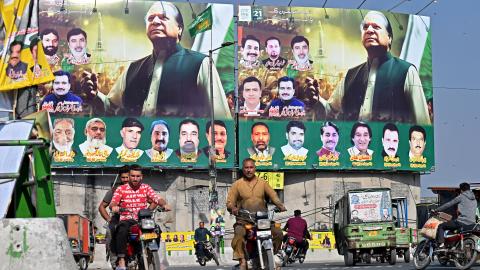Nawaz Sharif’s celebratory return to Pakistan after several years in exile will turn into a political triumph only if the country’s military establishment, which had banished him from politics six years ago and now facilitated his recent resurrection, fundamentally changes its behaviour. So far, it seems that the establishment sees Sharif as a much-needed alternative to the dangerous populism of Imran Khan.
Sharif’s return makes it easier to hold elections that he might win. But history does not give reason for optimism about him being able to complete his tenure, if elected, and having a free hand in policymaking. He has previously been elected prime minister thrice, only to be removed from office each time without completing his term. In 1993, he was removed from office by a Presidential decree. In 1999, he was toppled in a military coup. And in 2017, he was disqualified from being prime minister by judicial fiat.
He has retained a strong support base, especially in the military’s dominant recruiting region of Punjab, throughout the last three decades. But he has not seen eye to eye with successive army chiefs, several of whom were appointed by Sharif. The usual point of contention has been differences over security and foreign policies and over the military leaders’ right to determine policies. The question now is, will a fourth Sharif term conclude without a fatal altercation with Pakistan’s military leaders.
On the eve of the July 2018 elections that brought Imran Khan to office, I had predicted the return of Sharif in the not-too-distant future. “Even if the military succeeds in installing a selected prime minister into office after the votes are cast,” I wrote, “it will not succeed in its core objective of creating a credible, effective, civilian façade. Sharif’s imprisonment will not end his (or his daughter’s) political careers long after the retirement of the generals and colonels who plotted his downfall.”
That is exactly what happened. The generals’ choice, Imran Khan, became a greater threat to the almighty establishment than any other politician had ever been. After he was removed from office, the former cricketer went on a rampage that threatened Pakistan’s external relations as well as domestic order. Enraged by his arrest, Khan’s cult of fans attacked military installations — something even declared enemies of the Pakistani state had not done.
Unlike Sharif, and Benazir Bhutto before him, Imran Khan was not a politician locking horns with the military over civilian supremacy under the constitution. He was trying to prove that his popularity was greater than public approval for Pakistan’s military leaders and that he was stronger than the permanent state apparatus. The military responded with a crackdown, supported by most political elites, but given its unwillingness to impose military rule, it also needed a popular political alternative.
Sharif’s return, and the fast-track reversal of criminal charges and cases against him, is the result of the establishment’s desire to hold an election that Khan does not win. From the establishment’s perspective, Sharif would be a safer pair of hands than the narcissistic cricketer-turned-politician, given Sharif’s experience in both winning elections and governance. But the establishment’s willingness to let Sharif have another turn is a reflection of some difficult ground realities.
At the time Sharif was forced into exile, Pakistani Punjab was divided between Sharif’s anti-establishment followers, who believed that fighting the establishment to secure democracy was more important than fighting corruption, and Imran Khan’s pro-establishment supporters who repeated what had been the mantra of every Pakistani coup-maker: Pakistan’s politicians are a threat to the country; corruption must be eliminated before democracy can function; and generals and judges know what is in the country’s interest better than the illiterate peasants, workers, and the unemployed.
Now, Khan’s supporters have also turned against the establishment, albeit for different reasons. That necessitates a cooling-off period during which critical policy issues, such as managing the economy and reorienting Pakistan’s rather stagnant foreign policy can be tackled through cooperation between traditional politicians and the establishment. Khan and his fans can be wished away no more than Sharif and his supporters could be six years ago. But the Pakistani establishment, and Sharif, both seem to have decided to deal with that matter at a later stage.
Like all Pakistani politicians, Sharif has made compromises in his long career and has sometimes taken contrary public positions for short-term popularity. But he is identified, by and large, with an emphasis on economic progress and peaceful relations with Pakistan’s neighbours, including India. His views on economic liberalization and normalization with India have also been the major reason for his past conflicts with the establishment.
The timing of Sharif’s return is ominous. At a time when its economy is in shambles, Pakistan also confronts multiple external challenges. Relations with India are as strained as ever. Hopes that the Taliban’s control of Afghanistan will end threats to Pakistan from its northwestern border have proved futile. Pakistan now faces an increasing threat from local extremists and terrorists.
Moreover, Pakistan is no longer able to obtain military and economic assistance from the United States by highlighting support for America’s global objectives; its close partnership with China is yielding fewer economic benefits than Pakistani leaders expected; and Pakistan’s traditional friends in the Arab world have expanded their economic ties with India and want Pakistan to also straighten out its economy and end Islamist militancy.















